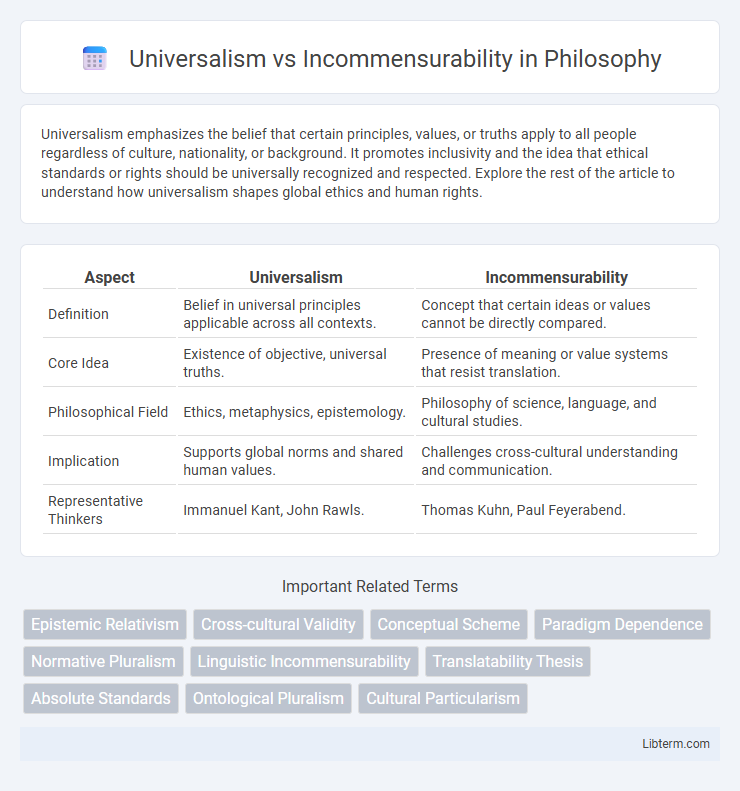Universalism emphasizes the belief that certain principles, values, or truths apply to all people regardless of culture, nationality, or background. It promotes inclusivity and the idea that ethical standards or rights should be universally recognized and respected. Explore the rest of the article to understand how universalism shapes global ethics and human rights.
Table of Comparison
| Aspect | Universalism | Incommensurability |
|---|---|---|
| Definition | Belief in universal principles applicable across all contexts. | Concept that certain ideas or values cannot be directly compared. |
| Core Idea | Existence of objective, universal truths. | Presence of meaning or value systems that resist translation. |
| Philosophical Field | Ethics, metaphysics, epistemology. | Philosophy of science, language, and cultural studies. |
| Implication | Supports global norms and shared human values. | Challenges cross-cultural understanding and communication. |
| Representative Thinkers | Immanuel Kant, John Rawls. | Thomas Kuhn, Paul Feyerabend. |
Understanding Universalism: A Foundational Overview
Universalism posits that certain truths or ethical principles apply universally, transcending cultural, historical, or individual differences. This foundational perspective supports the idea that objective standards can guide moral judgments or scientific inquiries across diverse contexts. Understanding Universalism involves recognizing its emphasis on commonality and shared values as the basis for coherence and consistency in knowledge and ethics.
Defining Incommensurability in Thought and Practice
Incommensurability in thought and practice refers to the fundamental incompatibility between different conceptual frameworks or paradigms, making direct comparison or translation impossible. This concept highlights that distinct scientific theories or cultural perspectives operate under divergent criteria of evaluation and meaning, challenging Universalism's assumption of a single, overarching standard. Recognizing incommensurability underscores the limits of universal measures and stresses the necessity of contextual understanding in cross-paradigmatic analysis.
Historical Contexts: Roots of the Debate
The debate between Universalism and Incommensurability traces its roots to the Enlightenment era, where universal principles were posited as foundational to human knowledge and morality. Historical encounters between Western and non-Western cultures during colonialism challenged these principles, highlighting cultural relativism and raising questions about the comparability of distinct epistemologies. Philosophers like Thomas Kuhn further advanced this discourse by arguing that scientific paradigms are incommensurable, reflecting deeper historical and cultural contingencies rather than universal standards.
Epistemological Perspectives: Knowledge and Truth
Universalism in epistemology asserts that knowledge and truth are absolute, objective, and accessible through rational inquiry, supporting the idea of universal standards for validating claims. Incommensurability challenges this by arguing that competing knowledge systems or paradigms are often incomparable due to fundamentally different concepts, languages, or methodologies, questioning the possibility of a single, universal truth. These epistemological perspectives highlight ongoing debates about the nature of truth, with universalism emphasizing equivalence and coherence, while incommensurability stresses context-dependence and relativism in understanding knowledge across diverse frameworks.
Cultural Relativism and the Limits of Universal Claims
Cultural relativism challenges universalism by emphasizing that moral values and practices are deeply rooted in specific cultural contexts, making universal claims difficult to justify across diverse societies. The concept of incommensurability highlights that fundamental differences between cultures create barriers to comparing ethical systems using a common standard. These perspectives underscore the limits of universal ethics by stressing the importance of understanding cultural specificity and rejecting one-size-fits-all moral judgments.
Ethics and Morality: Universal Principles vs. Local Values
Ethics and morality often grapple with universalism, advocating for consistent principles like justice and human rights that apply across cultures, versus incommensurability, which highlights the irreconcilable differences between local values and moral frameworks. Universal principles such as Kant's categorical imperative aim for objective standards, whereas local ethical systems emphasize context-specific values shaped by history, religion, and social norms. The tension between these perspectives challenges cross-cultural moral judgments and raises questions about respecting diversity while upholding fundamental rights.
Universalism in Science: Standards and Challenges
Universalism in science asserts that scientific standards and methods apply universally across cultures and contexts, promoting consistent evaluation of knowledge claims. This perspective emphasizes the importance of objective criteria such as empirical evidence, reproducibility, and logical coherence to maintain the integrity and comparability of scientific results. Challenges to universalism arise from cultural differences in epistemic values and interpretations, necessitating ongoing dialogue to address potential biases while preserving scientific rigor.
Language, Meaning, and Translation Barriers
Universalism in language posits that all human languages share fundamental semantic structures, enabling meaning to be translated across cultural boundaries. Incommensurability challenges this by arguing that some linguistic concepts are so culturally embedded that their meanings cannot be fully captured or translated into another language. Translation barriers arise from these deep cultural and contextual differences, hindering mutual understanding and highlighting the limits of universalist approaches to meaning.
Case Studies: Universalism vs. Incommensurability in Action
Case studies examining Universalism versus Incommensurability highlight the tensions between applying universal principles and recognizing cultural or contextual specificity. For instance, ethical dilemmas in global bioethics reveal conflicts where universal moral standards clash with local traditions and beliefs, demonstrating incommensurability in value systems. These real-world examples underscore challenges in creating frameworks that accommodate both universal norms and diverse cultural interpretations.
Toward Reconciliation: Bridging the Gap
Universalism asserts that ethical principles apply universally across cultures, while Incommensurability highlights the irreconcilable differences between distinct moral frameworks. Toward reconciliation, scholars explore dialogical approaches that emphasize mutual understanding and respect for diverse values without forcing homogenization. Integrative models seek common ground by focusing on shared human experiences and pragmatic cooperation to bridge these philosophical divides.
Universalism Infographic

 libterm.com
libterm.com